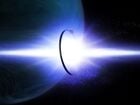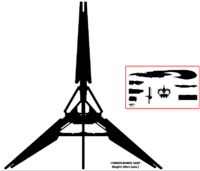Forerunner: Difference between revisions
From Halopedia, the Halo wiki
| Line 15: | Line 15: | ||
At some point, the Forerunners came into contact with [[the Flood]] (or possibly created the flood). Seeing the danger they posed to all life in the galaxy, the Forerunners attempted to contain them. They were able to study them in labs such as the one found in the gas mine on [[Threshold]]. Several hundred years after discovering the Flood, they created the Halos as weapons to be used as a last resort against the Flood, wiping out all sentient life with enough biomass to sustain them, killing the Flood through starvation. Another purpose of the Halos was to contain the Flood so the Forerunners could study them (as explained by [[343 Guilty Spark]] in [[Halo 1]].) They also assigned [[Monitor]]s to each ring with the tasks of maintaining them so that they could be used again in case of future outbreaks. | At some point, the Forerunners came into contact with [[the Flood]] (or possibly created the flood). Seeing the danger they posed to all life in the galaxy, the Forerunners attempted to contain them. They were able to study them in labs such as the one found in the gas mine on [[Threshold]]. Several hundred years after discovering the Flood, they created the Halos as weapons to be used as a last resort against the Flood, wiping out all sentient life with enough biomass to sustain them, killing the Flood through starvation. Another purpose of the Halos was to contain the Flood so the Forerunners could study them (as explained by [[343 Guilty Spark]] in [[Halo 1]].) They also assigned [[Monitor]]s to each ring with the tasks of maintaining them so that they could be used again in case of future outbreaks. | ||
In the second game, [[Halo 2]], [[ | In the second game, [[Halo 2]], [[2401 Penitent Tangent]] explains that after exhausting every other strategic option in their struggle against [[The Flood]], the Forerunners activated the Halos about 100,000 years ago[http://halosm.bungie.org/story/staten083106.html], destroying themselves along with all other sentient life of sufficient biomass to sustain the Flood within three radii of the galactic center. However, there is some speculation that the Forerunners might be alive in another galaxy. | ||
== Forerunners and humans? == | == Forerunners and humans? == | ||
Revision as of 12:35, January 23, 2007
Summary
"Forerunner(s)" is the translated Covenant name for the race that built the Halos. It is theorized that this same race is responsible for the artifact that was found on Reach, and on Sigma Octanus IV.
The artifacts appear to have originated on different worlds, but have somehow made it onto these other planets. These artifacts are our only means of finding information about the Forerunner.
It is argued that the Forerunner may be connected with the Jjaro from Bungie's previous games. The similarities are apparent.
Known History
Almost nothing is known about the history of the Forerunners, save that they were an extremely advanced civilization that inhabited the galaxy many thousands of years in the past, although it is unknown when they spread around the galaxy. They achieved an extremely high level of technological advancement, and the evidence of this can be seen scattered throughout the games. The fact that the Halos are stationed all round the galaxy could be seen as evidence that their empire covered the entire galaxy.
At some point, the Forerunners came into contact with the Flood (or possibly created the flood). Seeing the danger they posed to all life in the galaxy, the Forerunners attempted to contain them. They were able to study them in labs such as the one found in the gas mine on Threshold. Several hundred years after discovering the Flood, they created the Halos as weapons to be used as a last resort against the Flood, wiping out all sentient life with enough biomass to sustain them, killing the Flood through starvation. Another purpose of the Halos was to contain the Flood so the Forerunners could study them (as explained by 343 Guilty Spark in Halo 1.) They also assigned Monitors to each ring with the tasks of maintaining them so that they could be used again in case of future outbreaks.
In the second game, Halo 2, 2401 Penitent Tangent explains that after exhausting every other strategic option in their struggle against The Flood, the Forerunners activated the Halos about 100,000 years ago[1], destroying themselves along with all other sentient life of sufficient biomass to sustain the Flood within three radii of the galactic center. However, there is some speculation that the Forerunners might be alive in another galaxy.
Forerunners and humans?
Both the games and novels contain content that has led to speculation that the Forerunner species is somehow linked to Homosapiens of the 26th century. This section is a synopsis of the material in question.
Monitor 343 Guilty Spark says to the Master Chief in Halo 1, "The installation was specifically built to study and contain the Flood. Their survival as a race was dependent upon it. I am grateful to see that some of them survived to reproduce." Later, when 343 talks about activating the installation, he says, "Last time, you asked me, if it was my choice, would I do it? Having considerable time to ponder your query, my answer has not changed." 343 Guilty Spark also during Halo 1 says to the Master Chief "Please stop being human" if Master Chief shoots at him in the Library, possibly implying that the chief is Forerunner - or that the Forerunner are human.. The Halo installations seen in the games and novels also appear to have the same gravity and atmosphere as Earth; it would make sense that the Forerunner would attempt to make the Halos similar to their homeworld.
Late in the first Halo game, during a cutscene in the level, "The Maw", 343 is shown pulling data out of the Pillar of Autumn's data core while saying, "You can't imagine how exciting this is, to have a record of all of our lost time! Human history is it? Fascinating. Oh I shall enjoy every moment of its categorization...." Clearly another link between humans and Forerunners. Another link is that only humans can activate the rings, and only humans are Reclaimers. At the end of Halo 2, as the remaining rings are left perilously in standby after their firings are averted, Commander Miranda Keyes asks 343 Guilty Spark where one (i.e. the High Prophet of Truth) would go to remotely fire all the Halo rings. His response, full of surprise at the query, is "The Ark". The Arbiter then approaches from behind and asks "And where, Oracle, is that?". Before 343 answers his question, the cutscene transitions to show Truth's ship arriving outside Earth's orbit.
The novels also appear to offer hints about the link between humans and Forerunners. Several Spartans recognize Forerunner symbols but they can't quite place them, which suggests that they are most likely deep in the subconscious. In Halo: The Flood, the Master Chief just 'knows' how to activate the light bridge, for some strange reason; the same appears true when he activates the Silent Cartographer. In Halo: First Strike, the Spartans just "know" how to operate the Wraith tanks. If the Covenant did indeed salvage technology from the Forerunners, then that might explain it.
Halo 3 may also offer more clues or explanations. In the game's E3 announcement trailer, the vast Forerunner object the Master Chief observes resembles an earlier sketch that says "Ark" and Dervish, the early name for the Arbiter. Bungie has not confirmed that the object Master Chief witnesses is the Ark, only stating that it is a Forerunner artifact. Evidence (other then Bungie's comments of course),include Cortana's monologue in the second underwater elevator during the Halo 2 Level- "Regret". She states that the Covenant had not attacked Earth with full force, that they had come to find something. I.E. ,their decision to invade the planet as opposed to glassing it.
It would make sense on why the Prophets would order the destruction of the human race, as the possible link between humans and Forerunners would endanger the exalted status the Prophets have built for themselves in a religion centered around the technology of the Forerunners. Usually a new species is marked for subjugation into the Covenant, with the exception of humans who apparently are marked for genocide upon first contact.
Forerunner Weaponry
Forerunner constructs use a wide variety of weapons. The Sentinels wield energy beams, used mainly for fighting the Flood. Sentinel Majors have a more powerful and accurate version of the beam, which sports superior energy output at the cost of overheating issues. All varieties of these Sentinel Beams can be wielded by certain Covenant and Human infantry. Meanwhile, Enforcers are equipped with multiple packs of small rocket-like explosives launched over the top of their shield as well as weapons similar to Needlers, which fire clusters of smaller red crystals at a faster rate, used mainly against infantry at close range. These mammoth constructs also seem to be able to lift vehicles using some sort of magnetic grapple, before crushing even tank-sized objects between their massive 'arms'. The Sentinels of Onyx had significantly more powerful weaponry. They were described as spheres surrounded by three floating "booms" and had powerful energy shields. The shields could be tricked by dense, slower moving objects, such as rocks, which Team Saber used to destroy one of the Sentinels. Their energy weapons, described as a single golden beam, charged slowly, but when fired, could melt straight through the armor of the Spartan III's. These Sentinels also had the ability to "mate" for different purposes, such as stronger combat abilities, or excavation purposes. They were so powerful, they single-handedly destroyed two Covenant destroyers, and killed Team Gladius.
Forerunner Art and Architecture
Forerunner architecture is noted mainly for its geometric style and vast scale. It tends to be very elaborate, with numerous extrapolations of the basic design of a structure, all purely decorative. They use complex geometric shapes and hardly ever use anything but straight lines in their design.
The Forerunners tend to decorate the interiors of their structures with a complex web of engraved straight lines.
The fact that the Forerunners were able to build such giant structures as the Control Rooms, Libraries, the Temple, the Sentinel Wall shows that they likely had very sophisticated methods of building.
Fortress Worlds
- Main article: The Halos
- Control Room
- The Library
- Quarantine Zone
- Sentinel Wall
- The Temple
- Flood Research Facilities
- Relay Station
- Sentinel Production Facility
Installation 04, and 05 are the only two Fortress World's yet discovered in the Halo Universe but when we look at the Monitor naming scheme, they offer a clue as to the existence of other Halo's.
Looking at the number in 343 Guilty Spark, 343 is seven to the third power. Seven being a number seen frequently in Bungie games and mythology. The number "2401", from 2401 Penitent Tangent, is seven to the fourth power.
When the numbers of each Monitor are examined, a pattern emerges: each seems to be seven raised to the power of the installation number minus one; therefore this table to the right can be established.
Forerunner Installations
- The Ark - Controls all halo installations.
- Gas Mine -
- Onyx - A UNSC controlled world, inhabited by sentinels.
Forerunner Constructs
- Onyx Sentinels - Powerfully, adaptive Sentinel of Onyx.
- Enforcers - Enforce the Monitor's will.
- Sentinel Majors - A major of a sentinel.
- Sentinels - Responsible for guarding a halo.
- Constructors - Responsible for the repair of a halo.
Forerunner Artifacts and Technology
See also Technology
Related Links
Internal
External
- Forerunner Symbology - An article on Forerunner symbols.



